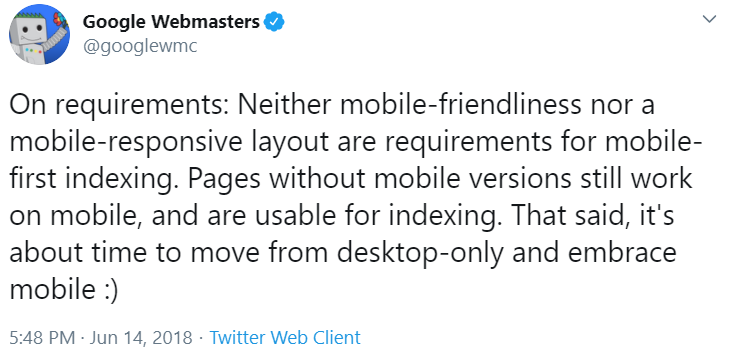Top 7 Essential Website Optimization Strategies
August 15, 2020
Article Overview
10min read
It is crucial to make sure that your website is perfect by all means – let that be UX design, site development or content – and for that, you need to optimize your website. Optimized websites help to get more rankings in search results, drive more web traffic, improve conversion rates, and thus achieve more productivity. However, today, SEO is also an essential part of any effective marketing strategy. So, focus on SEO essentials to attract more traffic and get more opportunities to convert potential customers.
Here are 7 SEO key strategies you can consider to optimize your website:
1. Go Mobile
With the increasing number of mobile users, making your website mobile friendly is getting more important. Smart marketers were implementing a mobile-first approach even long before Google’s Mobile-first index had officially rolled out. According to Google’s Webmasters tweet, it’s now time to move from desktop-only to mobile.

Many businesses have started optimizing their websites for mobiles by making them responsive, that is, responsive websites fit to any screen size or any device the user is viewing the site on – tablet, laptop, smartphone or desktop.
To make your site mobile friendly,
- Make the content easier to find and read.
- Ensure pages are easier to navigate.
- Avoid using flash throughout your website, it increases page loading time.
- Use large size buttons and large fonts.
- Use short Meta titles as it makes it easier to read on mobile devices.
- Avoid pop-ups.
- In a mobile-first world, instead of long-form content, make sure to use less content. It can equate to more traffic and better rankings.
- Perform regular audits to check mobile-friendliness.
2. Core Web Vitals
Each page in your site should offer better user experience, which improves search rankings and reduces the bounce rate. Good page experience creates happy visitors. In May 2020, Google has announced that it will be considering Core Web Vitals as a new ranking signal, which will be better known as a page experience signal. To meet this requirement, your web page must be optimized for key factors such as mobile-friendliness, safe-browsing, HTTPS-security, and intrusive interstitial guidelines. These metrics will help measure the user experience that your site provides.
In its blog, Search Engine Journal has reported that even if the website provides a poor page experience signal, it will rank well if the pages have highly relevant content that meets the query of the readers. Key tools that can be used to measure Core Web Vitals include PageSpeed Insights, Lighthouse, Search Console, and more.
3. User Intent
User intent, an important SEO aspect, refers to the right content to the right user. It is crucial to include the most useful information relevant for your target audience, that is, the goal for Google is to understand the context and serve results based on searcher intent. User intent makes advanced level keyword research and selection more important than ever.
To optimize the website for the right user intent,
- Have an understanding of the queries that drive clicks to your site.
- Perform keyword research and use service-related keywords that drive site visibility.
- Include a clear and attractive call to actions that stand out.
- Attach a survey form that includes questions regarding the search intent of your specific audience.
- Search intent can be informational, transactional, or navigational.
4. Schema Markups
Schema Markups refer to microdata that provides a summary of web pages found in search results. It also helps Google’s algorithms to track web pages. Added to the web page, it creates a rich snippet – an enhanced description that appears in the search results- and improves the search appearance. Leading search engines Google, Yahoo, Bing, Yandex, and many more support the use of microdata.
Quite simple to implement, optimized schema microdata is popularly used for blogs, events, articles, FAQs, products, reviews, and more. It also helps in voice search by helping in identifying whether your web page content fulfills what your audience is looking for.
Even though there is no evidence that adding schema has any influence on SERPs, it is considered that the real value in the schema can provide context to a webpage and improve the search experience.
5. Technical SEO
Along with all other aspects, consider the technical health of your website as well. Technical optimization helps to ensure that your web pages are structured for both users and search engines.
Some might find the idea of performing technical SEO to be menacing, but then with the help of many SEO tools now available, an SEO audit is no longer a daunting task.
For efficient technical optimization, check the following:
- Perform regular technical SEO audits.
- Ensuring your web pages – whether it is mobile or desktop – takes less loading time.
- Check to avoid 404 errors and broken links, remove unnecessary URLs.
- Check the robot.txt for errors and optimize it if needed.
- Examine and fix any issues on your site indexing via Google Search Console.
- Check for duplicate title tags and duplicate meta descriptions and fix it.
6. Building Links
Link building is a key ranking factor in SEO. Google has become more proficient at identifying and bringing down spammy links.
While internal links refer to connecting pieces of content across the website, backlinks are links from another website. Such links can be contextual or navigational. Good links can improve site navigation, increase visitor’s dwell time in your site, and thus better rankings.
Some of the best link building strategies include:
- Create interactive content with images and videos.
- Regularly post quality content on social networks.
- Answer Quora questions.
- Do guest blogging.
- Use Resource Links From Trusted Sites.
- Utilize Resource Pages.
- Broken Link Building.
- Link Reclamation and Claiming Unlinked Mentions.
7. Site Security
Make sure that your site is secure with HTTPS (Hypertext Transfer Protocol Secure). Along with protecting the content on the site, this protocol will protect users’ connections to your website.
While implementing this security system:
- Make sure to get security certificates from a reliable authority.
- Redirect pages with server-side 301 HTTP redirects.
Hope these tips help you optimize your website and meet the current digital marketing standards.


 +971 52 312 2506
+971 52 312 2506





